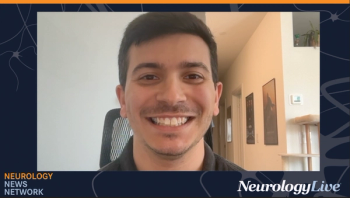
New findings reveal early treatment with Trappsol Cyclo shows promise for young patients with Niemann-Pick disease type C1, enhancing safety and efficacy.

New findings reveal early treatment with Trappsol Cyclo shows promise for young patients with Niemann-Pick disease type C1, enhancing safety and efficacy.

The president and founder of the Stuttering Treatment and Research Society highlighted the significance of interdisciplinary care for both children and adults with stuttering. [WATCH TIME: 5 minutes]

In honor of International Stuttering Awareness Day, the founder of the Stuttering Treatment and Research Society discussed understanding the diagnosis of stuttering and the importance of early intervention for patients.

David Stamler, MD, CEO at Alterity Therapeutics, gave clinical perspectives on ATH434, an emerging agent showing promise in phase 2 studies of multiple system atrophy.

A recent review of studies over the past decade, presented at CNS 2025, suggests that the ketogenic diet can significantly reduce seizure frequency in children with drug-resistant epilepsy.

A new study reported that children and adolescents with Tourette syndrome on dopamine D2 receptor antagonists had higher rates of psychiatric and metabolic adverse events than those unexposed.

The executive vice president and head of R&D at Lundbeck provided more context on the scientific rationale of amlenetug, an investigational monoclonal antibody designed to halt the spread of alpha-synuclein aggregates in multiple system atrophy. [WATCH TIME: 3 minutes]

Late breaking data from a phase 1 trial presented at MDS 2025 showed that cell therapy UX-DA001 demonstrated positive efficacy in a woman with moderate-to-advanced Parkinson disease.

At MDS 2025, the senior medical director of UCB's Translational Medicine Neuroscience and Gene Therapy presented data from the ATLANTIS study of glovadalen in patients with Parkinson disease. [WATCH TIME: 4 minutes]

The associate professor of neurology and pediatrics at the University of California, San Francisco, discussed updated recommendations for continuous EEG use in neonates, highlighting risk stratification, and the growing importance of family involvement. [WATCH TIME: 3 minutes]

An interim analysis from TEMPO-4, presented as a late-breaker at MDS 2025, showed that tavapadon showed sustained long-term safety in Parkinson disease.

Neurology News Network. for the week ending October 18, 2025. [WATCH TIME: 4 minutes]

A phase 3 trial presented at the 2025 MDS Congress suggests that staged, bilateral magnetic resonance–guided focused ultrasound may improve motor symptoms for patients with Parkinson disease who experience motor complications.

A phase 2 study presented at 2025 MDS revealed that onabotulinumtoxinA significantly improved tremor-related disability compared with placebo in patients with upper limb essential tremor.

Mind Moments®, a podcast from NeurologyLive®, brings you an exclusive interview with Orrin Devinsky, MD. [LISTEN TIME: 24 minutes]

The professor of neurology at Barts and The London School of Medicine and Dentistry provided commentary on the ways to improve inclusion for multiple sclerosis clinical trials, factoring in patients with more advanced stages of disease. [WATCH TIME: 4 minutes]

In phase 2a trial presented at MDS 2025, findings showed that VTX3232 achieved drug levels in plasma and cerebrospinal fluid that exceed the IC90 for NLRP3 inhibition by more than 3-fold.

Anne O’Donnell-Luria, MD, PhD, a practicing clinical geneticist at Boston Children’s Hospital, sat down at CNS 2025 to discuss advances in genomic diagnostics, variant interpretation, and the expanding impact of neurogenetic discovery on clinical practice.

The assistant professor of neurology at Oregon Health & Science University discussed emerging evidence that aerobic exercise may enhance remyelination in patients with multiple sclerosis. [WATCH TIME: 5 minutes]

At the 2025 CNS Annual Meeting, Craig Press, MD, discussed tailoring neuroICU treatment for pediatric patients, advances in seizure management, and how multidisciplinary collaboration can improve outcomes.

New real-world data presented at MDS 2025 demonstrated that foslevodopa/foscarbidopa reduced motor fluctuations and improved quality of life in patients with advanced Parkinson disease over 6 months.

The pediatrician in chief at Johns Hopkins Children’s Center outlined the logistical, ethical, and regulatory hurdles of conducting pediatric MS trials, emphasizing the need for faster, more inclusive study designs to bring emerging therapies to clinic. [WATCH TIME: 5 minutes]

Apitegromab, an invesigational muscle-targeting treatment, showed promising results in improving motor function among young patients with SMA in a phase 2 trial.

At CNS 2025, the child neurologist at Rady Children's Hospital-San Diego talked about the expanding role of genetics for diagnosis and treatment in pediatric neurology. [WATCH TIME: 5 minutes]

In this post-meeting Q&A, Claire Henchcliffe, MD, PhD, president-elect of the AALN, shared her reactions to AALN’s second annual meeting, the conversations that mattered most, and how the group plans to broaden and support neurology leadership in the year ahead.

Johan Luthman, executive vice president and head of R&D at Lundbeck, discussed the rationale behind amlenetug, its mechanism of action, and the company’s ongoing efforts in multiple system atrophy through the phase 3 MASCOT trial.

The professor of neurology at Barts and London School of Medicine and Dentistry discussed data from the phase 3b ORATORIO-HAND trial, which tested ocrelizumab’s effect in patients with more advanced primary progressive multiple sclerosis. [WATCH TIME: 5 minutes]

The pediatrician in chief at Johns Hopkins Children’s Center provided clinical insights on new findings demonstrating ocrelizumab’s potential in treating pediatric multiple sclerosis. [WATCH TIME: 4 minutes]

Gavin Giovannoni, MBBCh, PhD, FCP, FRCP, FRCPath, lead investigator of the phase 3 ORATORIO-HAND trial, provided comment on the results presented at ECTRIMS 2025, highlighting ocrelizumab’s therapeutic benefit in more advanced forms of multiple sclerosis.

Trofinetide shows significant real-world improvements in Rett syndrome symptoms for pediatric and adult patients, enhancing communication and quality of life.